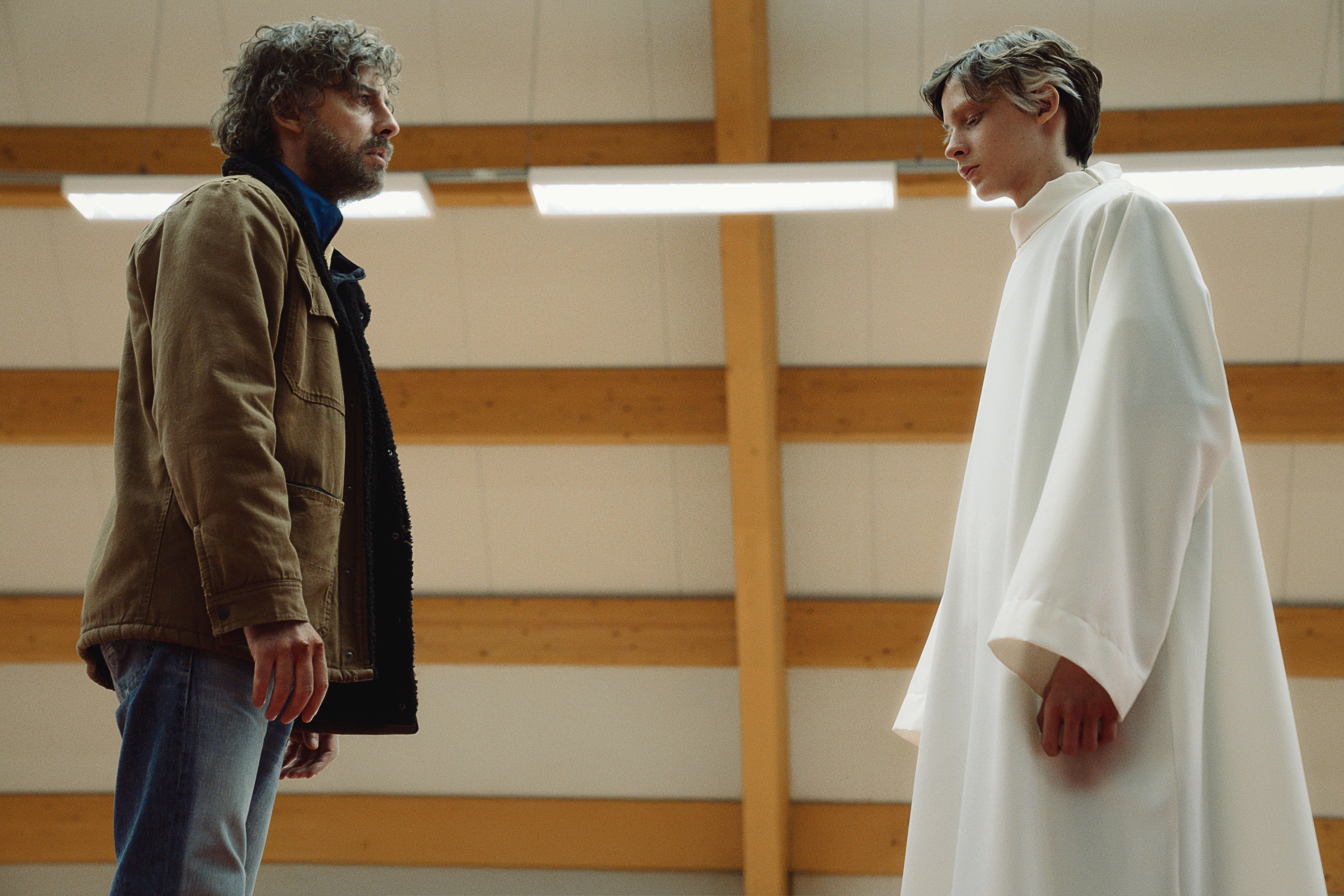The Holy Boy
La valle dei sorrisi
VERDICT: Paolo Strippoli puts his own spin on the intertwining of grief, faith and horror in the solidly intriguing ‘The Holy Boy’.
Paolo Strippoli’s 2022 film Flowing (Piove) used hugs as a visual cue of things returning to normal. That same gesture has a far more sinister connotation in the director’s new work The Holy Boy (La valle dei sorrisi), which is receiving a major push in Italy owing to Strippoli’s genre cred and the world premiere as a midnight event at the Venice Film Festival. The horror circuit should be equally welcoming internationally, thanks to the consistently unsettling mood and the evocative Alpine landscape.
The story takes place in the fictional locale of Remis, somewhere in the mountainous parts of (presumably) Friuli Venezia Giulia, where the film was shot. Sergio Rossetti (Michele Riondino), a P.E. teacher and former judo champion from Taranto, is hired as a substitute in the local high school, for what is supposed to be a run-of-the-mill three-month gig. The man, dealing with initially unspecified issues, is so jaded he doesn’t actually pay attention to what his students do, instructing them to run laps while he sneaks out for a cigarette.
One of the teenagers in his class is Matteo Corbin (the impressive young actor Giulio Feltri), who enjoys special privileges. The reason becomes apparent when Sergio’s excessive drinking causes Michela (Romana Maggiora Vergano), the owner of the local inn, to trust him with the explanation behind Remis’ nickname “The valley of Smiles”. Once a week, the locals head to a place of worship where, under the supervision of Matteo’s father Mauro (Paolo Pierobon) and the priest (Roberto Citran), they take turns hugging the young boy, who possesses the ability to absorb their pain and sadness.
This does not cause amnesia: Sergio openly states the feelings he had are still there. “They just don’t hurt anymore.” He therefore takes part in the great secret that has defined life in Remis ever since a tragic train crash that occurred in 2009, leading to the village’s need to cope with grief in this unusual way. Unlike most of the inhabitants, however, the teacher realizes Matteo is still a teenager, with the typical problems that time of one’s life can entail. And who knows what will happen if he figures out his powers could also be used for less noble purposes…
Nothing strictly new under the sun (it’s basically a gender-flipped Carrie by way of Midsommar, only starring some of Italy’s finest character actors), but Strippoli knows how to handle the tension, letting it build up over the course of two hours. Unlike one unlucky character late in the film, The Holy Boy is a slow burner, partly in keeping with the tradition of similarly themed stories and partly, perhaps, to avoid the censorship issues the director faced with Flowing (whose commercial performance domestically was compromised by the restrictive “18” rating).
Through this approach, Strippoli cleverly establishes the contrast between the awe-inspiring Alpine atmosphere and the profoundly rotten society that engages in religiously sanctioned child abuse – Matteo also sees the painful memories, which presumably has exposed him from an early age to images he was not meant to see – to keep up a cheerful façade that will come crashing down sooner or later.
Predictable though it may be, the character study is quietly affecting, which lends even more power to the truly horrific stuff once it occurs, as it concerns people we have grown to care about from the minute Sergio sets foot in a valley that claims to be all about smiles, but will eventually usher in a new era of tears. And by the time the pain comes, Strippoli will be leaving the area with the knowledge he’s once again shown his versatility in the field of European horror. And that is definitely something to smile about.
Director: Paolo Strippoli
Screenwriters: Jacopo Del Giudice, Paolo Strippoli, Milo Tissone
Cast: Michele Riondino, Romana Maggiora Vergano, Paolo Pierobon, Roberto Citran, Giulio Feltri
Producers: Domenico Procacci, Laura Paolucci, Ines Vasiljevi?, Stefano Sardo, Jožko Rutar
Cinematography: Cristiano Di Nicola
Production design: Marcello Di Carlo
Costume design: Susanna Mastroianni
Music: Federico Bisozzi, Davide Toma
Sound: Francesco Morosini
Production companies: Fandango, Nightswim, Spok Films
World sales: Fandango Sales
Venue: Venice Film Festival (Out of Competition)
In Italian
122 minutes

